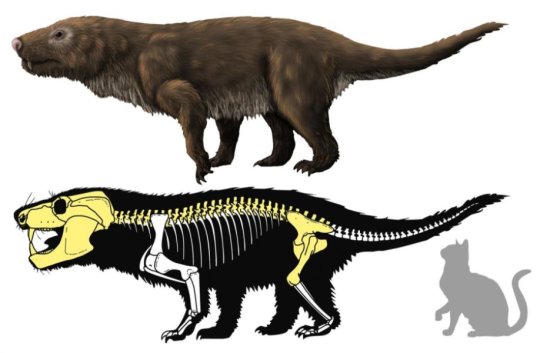@WFS,World Fossil Society,Riffin T Sajeev,Russel T Sajeev
Some Late Triassic Brazilian fossils of mammal-like reptiles, previously identified as Chiniquodon, may in fact be the first Aleodon specimens found outside Africa, according to a study published June 14, 2017 in the open-access journal PLOS ONE by Agustín Martinelli from the Universidade Federal of Rio Grande do Sul, Brazil, and colleagues.

This is an artistic reconstruction and skeleton made by Voltaire Paes Neto.
Credit: Voltaire Paes Neto; CC-BY
Aleodon is a genus of probainognathian cynodont, a taxon which evolved in the Triassic period, co-existed with dinosaur precursors and other archosaurs and eventually gave rise to mammals. The Aleodon genus was first described using fossils from Tanzania and Namibia, but it was not clear if it belonged within the family of carnivorous mammal-like reptiles known as Chiniquodontids, which includes the morphologically similar Chiniquodon.
The authors of the present study examined the skulls, jaws and teeth of Middle-Late Triassic fossil specimens from the Dinodontosaurus Assemblage Zone in Rio Grande do Sul, Brazil, most of which were previously thought to be Chiniquodontids, and compared them to a known African Aleodon species, A. brachyrhamphus.
The researchers used tooth morphology to identify one of the specimens as a new Aleodon species, which they named A. cromptoni after Dr Alfred “Fuzz” Crompton, who described the Aleodon genus. They also identified as Aleodon seven Brazilian specimens, previously thought to be chiniquodontids or traversodontids, and possibly one Namibian specimen, noting that this may call the reliability of Chiniquodon identification into question. Phylogenetic analysis indicated that Aleodon cromptoni may be, as suspected, a species in the Chiniquodonidae family.
Whilst the analysis was limited by the partial nature of some of the specimens, the authors note that the identification of these Late Triassic Aleodon specimens in Brazil strengthens the correlation between probainognathians from this epoch in South America and in Africa.
@WFS,World Fossil Society,Riffin T Sajeev,Russel T Sajeev
source-sciencedaily



 June 15th, 2017
June 15th, 2017  Riffin
Riffin  Posted in
Posted in  Tags:
Tags: 